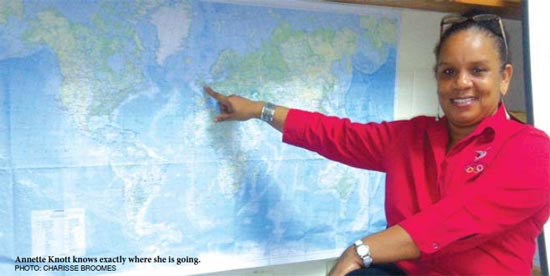
Coordinator of the FIFA/CIES PG Sport Management Programme, Charisse Broomes, talks to Annette Knott, the first female Chef de Mission accompanying the T&T Olympic team to London.
 CB: Only a few days left before the big event, how do you feel? CB: Only a few days left before the big event, how do you feel?
AK: These are exciting times and I am really excited, perhaps just as excited as the athletes. This is my first Olympics experience, and I think that for anybody, whether athlete or administrator, being able to represent your country at the Olympics is an honour and I am honoured to be chosen to be Chef de Mission of the Team T&T.
CB: What will be the role of the Chef once you leave with the team?
AK: We have a lot of bright young athletes, they know what they are doing, they know what they’re about and they’re focused. It’s no longer a question of only depending on athletes’ talent. For example, someone like Cleopatra Borrell-Brown, you never have to ask Cleo whether or not she’s eating correctly or going to bed on time. These athletes are so disciplined that really, your role as an administrator is to facilitate things so that they are comfortable; that they have the amenities they need in order to perform at their best. Your role is not so much to discipline and manage as in the past, it’s mostly about facilitation.
CB: You’ve just completed the Post Graduate Diploma in Sports Management. How do you think the courses within the programme have affected your life and performance as a sport administrator and now Chef de Mission to a national Olympic team?
AK: Before the Post Graduate Sports Management programme I felt I was a reasonably good administrator. I’m on the Olympic Committee (of Trinidad and Tobago), I’ve been the manager of many teams over many years especially for Hockey and I’ve been a member of the Hockey Board for 10 years, both as a manager and secretary and I’ve always felt that I was pretty capable.
The UWI/FIFA/CIES Post Graduate programme has enhanced everything I’ve done. It’s made me look at sport in a more analytical way. Now that I’ve gone on to do research it’s important that we take that analytical approach in every aspect of sport, especially where data collection is concerned. Even as Secretary of the Trinidad and Tobago Hockey Board I only now realize the paucity of data available to us, and there is really no reason why in this day and age, with the advancement of technology that we should not be able to have access to data ten or twenty years prior.
The Sport Management programme made you start to focus on the things that are important; for example, the Law Module, you now have a different way of looking at your contracts or your constitution, whereas in the past you took things for granted or you passed it on to a lawyer. I can now sit in a meeting and make critical comments and contributions.
CB: Do you believe that The UWI has anything to offer our Caribbean region in terms of a Sports Management and Administration that fits?
AK: I think sport has not had the respect that it has demanded, maybe because so much of the activities and administration in the past have been ad hoc. It’s mostly been dependent on whether or not you had a ‘good’ person behind the desk. The Post Graduate Sports Management Programme provides people with knowledge consistently coming out of the University. It will not happen overnight, but within five years at least, you will have more and more people who have the necessary knowledge to take sport to the desired standard.
CB: What do you see as the trend for sport administrators?
AK: The athletes that we have out there are professionals. Very often our athletes are more organized and have their planning sorted more than the people who are doing the administrative work. So sometimes we go off to games and you have the managers with the attitude that ‘I am the manager’ and they are not assisting or are unable to assist the athletes because the athletes are so far ahead of them. Our athletes are progressing but our managers and administrators are not. This programme can help people who want to manage teams. It’s not simply about carrying water or organizing uniforms or because you can get a few sponsors. Management is about keeping data on the athlete, profiling them, being able to intelligently speak with the athletes regarding nutrition or counselling, and so on.
CB: Is there anything you’d like to say to Team T&T and to Trinidad before heading off to London 2012?
AK: As you rightly said, Trinidad and Tobago is going to the London Olympics as a team. Often people think it’s only athletics or that we have a swimmer or a shooter. We are going with six disciplines. One of the reasons we are having a pre Games camp is to build the team. It’s tense out there, everybody wants to win. It will really make a difference if Team T&T felt that we’ll be there as a team and there for each other and this is not only the athletes but managers, administrators the medical team, etc. We are building Team T&T over the next two or three weeks and when we arrive at the Games I believe we will be a force to be reckoned with.
|





